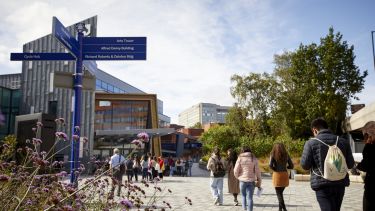- The University of Sheffield has been named a ‘University of Sanctuary’ in recognition of its support for displaced people
- Sheffield has joined a national network of universities in the UK that are committed to helping students and scholars who are fleeing war, persecution or other disasters.
- The University has a long history of welcoming people seeking sanctuary through scholarships, academic placements, language courses, one-to-one support and programmes of activities to help students and scholars who have been forcibly displaced to commence or continue their studies at Sheffield
The University of Sheffield has been named a ‘University of Sanctuary’ in recognition of its support for displaced people.
Sheffield has now joined a national network of universities in the UK that are committed to helping students and academics who are fleeing war, persecution or other disasters in their home country.
The University has a long history of welcoming people seeking sanctuary. Its current support package includes Sanctuary Scholarships – five fully-funded scholarships for students who have sought refuge in the UK. The scholarships are designed to help students who have been displaced, affected by conflict or have another reason for their forced migration to study at Sheffield. The scholarships cover the cost of tuition and provide a £10,300 award to support living costs for each year of study.
Once students join the University, it has a number of regular activities to help them make friends and settle into life at the University of Sheffield, such as Global Cafe – a chance to meet university ambassadors and fellow Sheffield students – crafts and games, local history walks and regular drop-in sessions for advice and support on all aspects of student life.
Other examples of Sheffield’s sanctuary work include an international visitors scheme for academics. This enables academics affected by war or persecution to come to Sheffield for an extended period of time, such as six months or a year, to continue their research.
The University also works with local partners to help provide support to people seeking sanctuary in Sheffield and the South Yorkshire region.
It recently provided funding and support to the Sheffield branch of The Association of Ukrainians in Great Britain (AUGB) to set up educational and social opportunities for Ukrainians newly arrived in the city following the Russian invasion of Ukraine. The University works with Student Action for Refugees Sheffield (STAR) to provide computer accounts and University Library access for local refugees and asylum seekers, so they can access the wireless internet network across the University’s campus.
Asylum seekers and refugees can also access the University’s library resources and online English language support materials for free.
Experts in business and finance, from the University’s Management School, recently ran a Young Changemakers project to help displaced young people in South Yorkshire become future leaders of their communities.
The initiative saw teenage refugees work together in teams to create their own ideas on how the city of Sheffield can reach one of the United Nations’ Sustainable Development Goals. The programme ended with a mock UN meeting where each team presented a summary of their recommendations to Sheffield City Council.
The University’s English Language Teaching Centre is working with the Rahela Trust charity to deliver confidence-building English language lessons to women in Afghanistan. The lessons are delivered using mobile phones, including interactive self-study lessons and live one-to-one audio conversations with a tutor. Following the success of the course, the project is now looking at ways to support other women in the region.
Researchers from the University’s Grantham Centre for Sustainable Futures have been working with academics, experts and refugees co-creating sustainable solutions to life at the Zaatari refugee camp in Jordan.
Together they recycle materials from the camp to create home improvements and agricultural innovations. Old mattresses, bikes and yogurt pots have all found new life there. So far they have created hydroponic systems, air conditioning, and wheelchairs.
Rob Sykes, Chief Operating Officer and Chair of the University of Sheffield’s Sanctuary Steering Group, said: “The University of Sheffield has, and always will be, a place that is open and welcoming to students and scholars from all over the world. We know that we can’t solve all of the world’s crises and challenges, but we want to do what we can to try to support students and scholars who have been forcibly displaced.
“We are very pleased to be recognised as a University of Sanctuary. We look forward to learning and sharing good practice with the universities of sanctuary network as we continue this important work.”
Chishamiso Mkundi is a business management student at the University of Sheffield from Zimbabwe and a Sanctuary Scholarship recipient. He started his foundation year with the University’s Lifelong learning team, which offers specialist support for adults restarting their educational journey. He said: “The University of Sanctuary is what every refugee needs. It has provided me with hope when I was hopeless, assurance when I was doubtful, a brighter future when everything looked bleak. It also made me not forget, but realise that what happened in the past does not shape your future. The University awarded me a full scholarship which means that I do not have to worry about where my next meal is coming from or worry about paying my tuition fees. Without the scholarship these would have been my daily worries.”
More information on the University of Sheffield’s support for refugee students and scholars.
Contact
For further information please contact:




